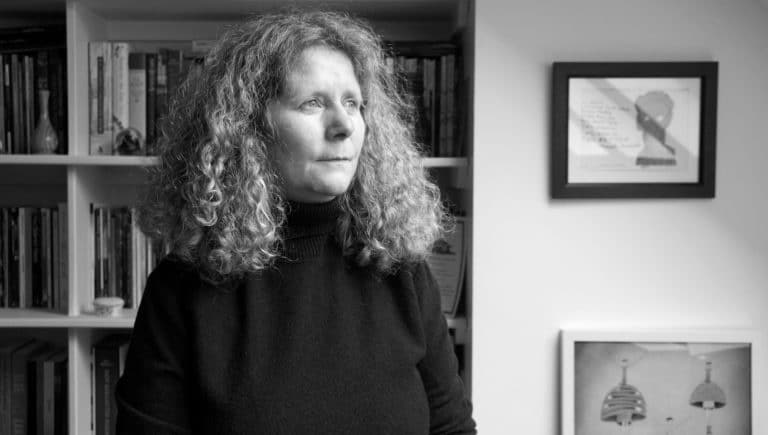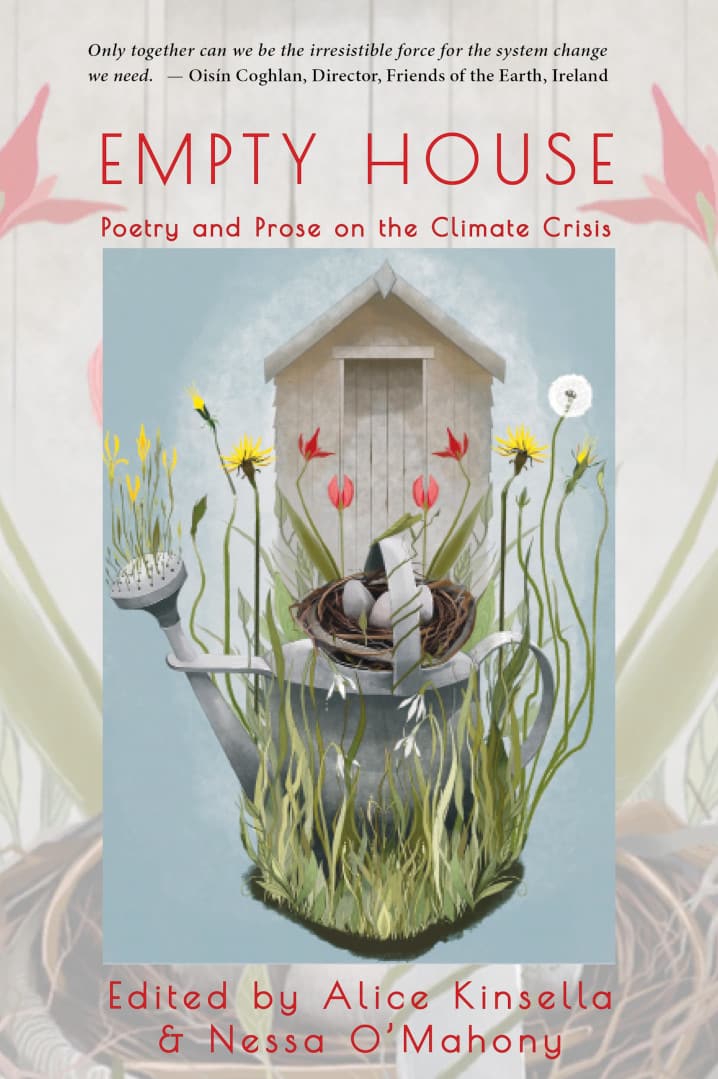Free shipping in Ireland over €25. Free worldwide shipping on orders over €50

NESSA O’MAHONY was born in Dublin and lives there. She won the National Women’s Poetry Competition and was shortlisted for the Patrick Kavanagh Prize and Hennessy Literature Awards. She is the recipient of three literature bursaries from the Arts Council of Ireland, the most recent being in 2018. She has a PhD in Creative Writing from Bangor University and teaches with the Open University and the American College in Dublin. She has published five books of poetry — Bar Talk, (1999), Trapping a Ghost (2005), In Sight of Home (2009) and Her Father’s Daughter (2014). The Hollow Woman on the Island was published by Salmon Poetry in May 2019. Her first work of historic crime fiction, The Branchman, was published by Arlen House in 2018.
Only together can we be the irresistible force for the system change we need.
— Oisín Coghlan, Director, Friends of the Earth, Ireland
Anxiety brought me to this book. A poet tucked away on the west coast of a small country, I felt pretty helpless; worse, useless as I read the endless reports and papers on rising global temperatures, destruction of biodiversity, and with it, mass extinction.
The climate crisis has long since hovered in my mind, but I was ‘living as if someone else is bound to do something about it,’ as Michael Viney warns us against in his piece, ‘Nature Undone and the End of Love’.
How would my generation, and those coming fast on our heels, live to watch the earth die, knowing we had done nothing to stop it? I wanted to apply the small skills I have learned, working with words, with books, with writers, and translate that work into aid for those on the front lines in environmental activism, in this case, Friends of the Earth.
Doire Press kindly took on the project and with it gave their time, resources and endless skill to bring this book into the world.
I have been incredibly fortunate to have the expertise of Nessa O’Mahony as co-editor from early in the process. Her generosity, sharp eye and considerable knowledge have made this a more pleasant experience than I could have hoped for.
As the submissions came in, images began to recur. Birds and bees. Water and fire. Two such images that seemed to come up more than others were storms and houses. A house, the structure we create to give our families security, safety, comfort. And what we fear: a storm, a flood, disaster, coming to take it away.
This anxiety was tangible in poems like ‘Mercury Rising’ by Moyra Donaldson and ‘Walrus’ by Jessica Traynor. Nuala O’Connor’s ‘Fall’ paints a harrowing picture of a mother fleeing, while David Butler’s ‘Gorse Fire’ reminds us that anywhere can be struck by disaster and the consequences that often linger.
These exquisite works are not always easy reads.
I started editing this anthology with a detachment that allowed me to read the statistics, to watch the reports, to engage with other writers on the subject.
Midway through the process my son was born and that detachment vanished. In the early months of his life I spent hours dwelling on the future of the world I had brought him into.
Fear paralysed me.
I was afraid to log onto social media, where the waves of bad news seemed endless. I was afraid to open the folder of submissions. To read about the extinctions and floods. The anxieties of other people.
Many of those who wrote for this book or who are now reading this are familiar with that feeling. The pain of contemplating their children, their grandchildren, in a dying world.
Phrases like ‘eco-anxiety’ and ‘climate grief’ have become part of the global lexicon. According to Time magazine, eco-anxiety was first defined in 2017 by The American Psychological Association as ‘a chronic fear of environmental doom’.
Anxiety is the feeling of the body’s response to stress. Unlike an anxiety disorder, where the symptoms may come from everyday situations, eco-anxiety is a response to a very real threat.
The eco in ecosystem, ecology, eco-anxiety comes from the ancient Greek Oikis, meaning the house, family or household. Or, commonly translated to one word: home.
A human right: a home.
Eco-anxiety. We are afraid of losing our home.
In her wonderful poem ‘Night Sky’, Catherine Phil MacCarthy reimagines earth as a house. It is from this poem the anthology gets its name, Empty House.
It felt fitting to give this book a name that hinted at what we have to lose.
‘Could it be sometime
we are not there,
gone without trace,
planet earth, an empty house’
It is worth remembering that houses are empty until we fill them with life. Make them a home.
Our artist Catherine Gavin took inspiration from the works throughout and used references to gardens, flooding and the seasons out of sync, to beautifully illustrate people’s relationship with the house, nature and home.
When I did finally return to work, I found, rather than my fear worsening, it shifted. I connected with the anxieties of others and was soothed by the stories of human connections against the backdrop of a volatile natural world. The courage and fear of the parent in Jessica Traynor’s ‘Walrus’ and in Victoria Kennefick’s ‘On Being Two in The Anthropocene’. The sense of international community in Luka Bloom’s ‘Little Blue Vase’. In ‘Art in the Climate of Change’, Ingrid Casey speaks with passion on the power of political art. Reading these reminded me what I wanted this book to be: a call to action.
A vital contribution to this anthology has been the work of young writers. Siobhán Fitzgerald’s poem is a heartfelt glimpse into the worries of a generation failed by its predecessors; Mia Darcy’s story is an imaginative tour through the centuries that’s as much foresight as it is sci-fi. This is a generation growing up with the presence of the climate crisis, and their voices, more than any of ours, are important.
Editing this book gave me the privilege of company for my worries. Fear is a global human experience. Now, what do we do with it?
Some, like I was, are overwhelmed. Some, though we wish it weren’t the case, are in denial. Some are fighting as hard as they can.
The human race has never before faced a problem of such enormity. But we are no stranger to adversity. In our own small country of Ireland, we have seen grassroot movements lead to two major political changes in recent years—repealing the Eighth Amendment and legalising same sex marriage. Like the climate crisis, these were human-made problems that needed human solutions.
It is important not to let fear become inaction.
‘Unconquerable? My dear, so was the divine right of kings,’ writes activist Saoi O’Connor in her poem. This is a reminder to keep close when the challenge seems insurmountable.
I write this now, in the middle of the Covid-19 pandemic. After months confined to our houses, we’ve been learning to redefine home. We use the phrase stuck at home, but are aware of the luxury of having a home to weather the storm.
A world away from my house on the west coast of Ireland, fire ravages the west coast of America. It would be a mistake to detach again from the signs of crisis. We live in one world. It’s our only home, and it is on fire.
Lisa McInerney opens her story with the ominous, ‘Obvious now that it was the beginning of the end but at the time that felt like pessimism.’ A comforting thought, now, that those who face the reality of the climate crisis are pessimists. That it won’t be as bad as they say.
I like to think that it isn’t pessimism to acknowledge the peril we now face, to know that action on a global scale is our only hope. To engage with the realities is to be optimistic. Because it’s only by acknowledging the very real threats that we have any hope of preventing them. This has to be a turning point: to believe in our capacity for good and join a global movement to halt the catastrophic effects of the climate crisis while we still can.
Alice Kinsella
September, 2020

Isbn: 978-1-907682-80-3 | Pages: 200 | Published: 2021
Empty House is a multi-genre anthology of Irish and international writing responding to the climate crisis. The leading challenge facing our world today, here writers share pieces that address what it is like to live in a world imperiled by climate chaos. Interpretations vary from celebrations of the natural world we are at risk of losing, anxious prophecies of the Earth we may soon live in, to constructive hope of how we can prevent environmental catastrophe. Together they form a rallying cry of human responses to a systemic problem. Contributors include Luka Bloom, Niamh Boyce, Jan Carson, Jane Clarke, Moyra Donaldson, Arnold Thomas Fanning, Rebecca Goss, Claire Hennessy, Lisa McInerney, Paula Meehan, Annemarie Ní Churreáin, Nuala O’Connor, Rick O’Shea, Jessica Traynor and Michael Viney.